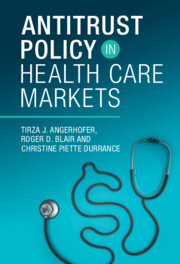Book contents
- Antitrust Policy in Health Care Markets
- Antitrust Policy in Health Care Markets
- Copyright page
- Dedication
- Contents
- Figures
- Tables
- Acknowledgments
- Table of Cases
- 1 Health Care Markets and Competition Policy
- 2 Antitrust Policy in the United States
- Part I Monopoly
- Part II Seller Cartels
- Part III Monopsony
- Part IV Buyer Cartels
- 14 Collusion in the Nurse Labor Market
- 15 Collusion in the Oocyte Market
- 16 No-Poaching Agreements and Antitrust Policy
- Part V Mergers and Acquisitions
- Index
- References
16 - No-Poaching Agreements and Antitrust Policy
from Part IV - Buyer Cartels
Published online by Cambridge University Press: 24 November 2022
- Antitrust Policy in Health Care Markets
- Antitrust Policy in Health Care Markets
- Copyright page
- Dedication
- Contents
- Figures
- Tables
- Acknowledgments
- Table of Cases
- 1 Health Care Markets and Competition Policy
- 2 Antitrust Policy in the United States
- Part I Monopoly
- Part II Seller Cartels
- Part III Monopsony
- Part IV Buyer Cartels
- 14 Collusion in the Nurse Labor Market
- 15 Collusion in the Oocyte Market
- 16 No-Poaching Agreements and Antitrust Policy
- Part V Mergers and Acquisitions
- Index
- References
Summary
In recent years, the exercise of monopsony power has become more prevalent in labor markets, particularly through anticompetitive agreements among firms. No-poaching agreements are agreements among rival employers to refrain from hiring another firm’s employees. No-poaching agreements deprive employees of the competitive benefits that result from outside employer interest. Recent litigation in a variety of industries highlights the competitive concerns with no-poaching agreements. In this chapter, we explore the role of monopsony and buying power in no-poaching agreements and specifically review a no-poaching case involving the deans of two medical schools in North Carolina.
- Type
- Chapter
- Information
- Antitrust Policy in Health Care Markets , pp. 368 - 384Publisher: Cambridge University PressPrint publication year: 2022

